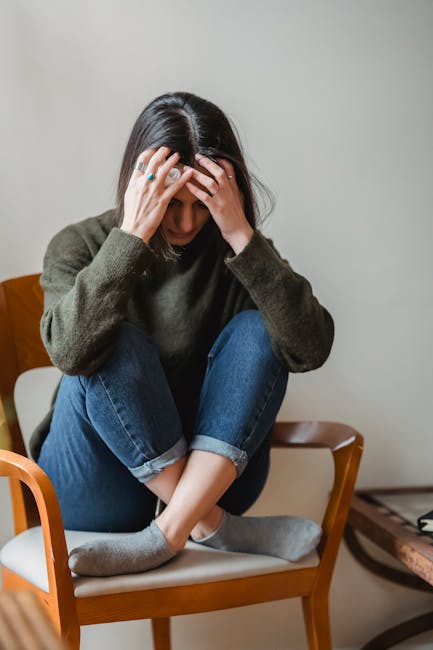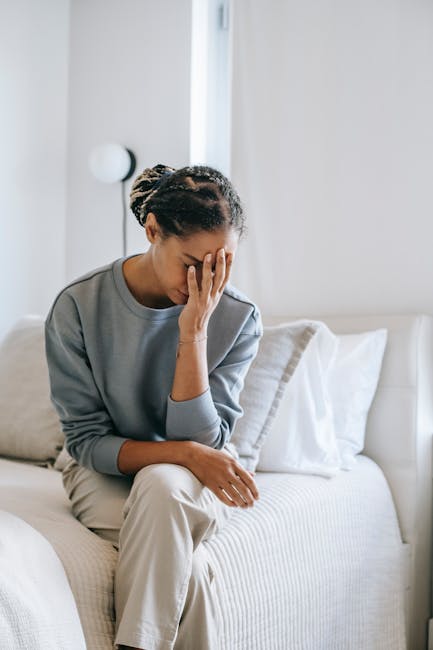If you’ve ever asked yourself, “What techniques can I use to cope with anxiety and panic attacks?” you’re not alone. Many people struggle with these intense feelings of fear and worry. But don’t worry, there are ways to manage these episodes and regain control of your life. Keep reading to learn about the signs of anxiety and panic attacks, immediate coping techniques, long-term strategies, and how to build a support system.
Key Takeaways
- Recognizing the signs of anxiety and panic attacks is the first step towards managing them.
- Breathing techniques, sensory engagement, and mental focus strategies can help during an immediate panic attack.
- Long-term strategies include medication management, therapy, and lifestyle changes.
- Building a support system and preparing for future episodes can help manage anxiety in the long run.
Understanding Anxiety and Panic Attacks
Recognize the Signs of Anxiety and Panic Attacks
Anxiety and panic attacks can manifest in various ways, including a racing heart, shortness of breath, trembling, sweating, and feelings of impending doom. Recognizing these signs is the first step towards managing your anxiety and panic attacks.
Learn Your Triggers
Identifying what triggers your anxiety or panic attacks can help you anticipate and manage them better. Triggers can be anything from certain situations, thoughts, or even physical sensations.

Immediate Techniques to Cope with Anxiety and Panic Attacks
Breathing Techniques
Take Deep Breaths
Deep breathing can help slow your heart rate and calm your mind. Try inhaling slowly through your nose, hold your breath for a few seconds, then exhale slowly through your mouth.
Use the 5-4-3-2-1 Method
This method involves identifying five things you can see, four things you can touch, three things you can hear, two things you can smell, and one thing you can taste. This can help ground you in the present moment and distract you from your anxiety.
Sensory Engagement
Smell Some Lavender
Lavender is known for its calming properties. Smelling lavender oil during a panic attack can help soothe your nerves.
Focus on an Object
Choose an object in your vicinity and focus all your attention on it. Describe it in detail to yourself. This can help distract your mind from your anxiety.
Physical Responses
Walk or Do Some Light Exercise
Physical activity can help reduce anxiety by releasing endorphins, the body’s natural mood boosters. A short walk or some light stretching can help.
Try Muscle Relaxation Techniques
Progressive muscle relaxation involves tensing and then releasing different muscle groups in your body. This can help you relax and distract your mind from anxious thoughts.
Mental Focus Strategies
Picture a Happy Place
Visualizing a peaceful and happy place can help calm your mind. It could be a beach, a forest, or even a memory of a place where you felt calm and happy.
Repeat a Mantra Internally
Repeating a calming mantra to yourself can help you focus and reduce anxiety. It could be something like “I am calm and in control” or “This too shall pass”.
Grounding Techniques
Close Your Eyes
Closing your eyes can help block out any overwhelming stimuli and help you focus on your breathing or mantra.
Practice Mindfulness
Mindfulness involves focusing on the present moment without judgment. It can help you stay grounded during a panic attack.
Find a Focus Object
Having a small object that you can touch and focus on during a panic attack can help ground you. It could be a small stone, a piece of jewelry, or anything else that’s comforting to you.

Long-Term Strategies for Managing Anxiety
Medication Management
Take Any Prescribed Medications
If your healthcare provider has prescribed medication for your anxiety, make sure to take it as directed. Medication can help manage your symptoms and make other coping strategies more effective.
Understand Medication Effects and Side Effects
It’s important to understand how your medication works and what side effects it may have. This can help you manage your expectations and better cope with any potential side effects.
Counseling and Therapy
Seek Professional Counseling
Professional counseling can provide you with tools and strategies to manage your anxiety. Cognitive-behavioral therapy (CBT) is particularly effective for anxiety disorders.
Explore Different Types of Therapy
There are many different types of therapy that can help with anxiety, including exposure therapy, dialectical behavior therapy (DBT), and acceptance and commitment therapy (ACT). Explore different options to find what works best for you.
Lifestyle Changes
Engage in Regular Exercise
Regular physical activity can help reduce anxiety by boosting your mood and acting as a natural stress reliever. Aim for at least 30 minutes of moderate-intensity exercise most days of the week.
Maintain a Healthy Diet
What you eat can affect your mood and anxiety levels. Try to maintain a balanced diet rich in fruits, vegetables, lean proteins, and whole grains.

Building a Support System
Communicate with Loved Ones
Tell Someone About Your Anxiety and Panic Attacks
Sharing your experiences with a trusted friend or family member can help you feel understood and less alone. They can also provide support during a panic attack.
Share Your Coping Techniques and Triggers
Letting your loved ones know what helps you during a panic attack and what triggers your anxiety can help them provide better support.
Professional Support
Work with a Therapist or Counselor
A mental health professional can provide you with strategies to manage your anxiety and support you in your journey.
Consider Support Groups
Support groups can provide a safe space to share your experiences and learn from others who are going through the same thing.
Preparing for Future Episodes
Develop a Personalized Coping Strategy
Identify Effective Techniques from Past Experiences
Reflect on what has helped you during past panic attacks and incorporate these techniques into your coping strategy.
Keep Necessary Items on Hand (e.g., Lavender, Medication)
Having items that help you during a panic attack readily available can help you feel more prepared and in control.
Create a Safe and Peaceful Environment
Find a Peaceful Spot for Immediate Relief
Having a designated spot where you can go during a panic attack can provide a sense of safety and control.
Make Your Living Space More Relaxing
Creating a calm and peaceful environment can help reduce anxiety. This could involve decluttering, adding calming elements like plants or soothing colors, or creating a dedicated relaxation space.
Educate Yourself and Others
Learn More About Anxiety and Panic Attacks
Understanding your anxiety can help you manage it better. There are many resources available online, including articles on managing anxiety and panic attacks and natural ways to relieve panic attacks.
Educate Close Friends and Family on How to Help
Letting your loved ones know how they can support you during a panic attack can help them feel more confident in their ability to help and can provide you with better support.
Remember, it’s okay to ask for help and take care of your mental health. With the right strategies and support, you can manage your anxiety and live a fulfilling life. For more information on how to calm your body from anxiety, check out this article.
Sources: Medical News Today, NHS Inform, Mayo Clinic Health System.
Gently Navigating the Waves: Your FAQ Guide to Coping with Anxiety and Panic Attacks
What are some immediate techniques to calm down during a panic attack?
Breathing exercises are a powerful tool to regain control during a panic attack. Try the 4-7-8 technique: inhale for 4 seconds, hold your breath for 7 seconds, and exhale slowly for 8 seconds. This helps reduce the intensity of your panic attack by increasing the amount of oxygen in your bloodstream. Grounding techniques, such as naming objects around you or touching various textures, can also help bring your focus back to the present.
Can physical exercise help with anxiety?
Yes, regular physical exercise can significantly help manage anxiety. Activities like walking, running, yoga, or swimming release endorphins, which are natural mood lifters. Exercise also helps by taking your mind off your worries and improving your sleep patterns, which can be negatively affected by anxiety.
How important is sleep in managing anxiety and panic attacks?
Sleep plays a crucial role in managing anxiety. Lack of sleep can exacerbate anxiety symptoms and even trigger panic attacks. Establishing a regular sleep schedule, creating a relaxing bedtime routine, and minimizing screen time before bed can help improve the quality of your sleep.
What dietary changes can help reduce anxiety?
Diet can impact anxiety levels. Reducing caffeine and sugar intake can help lower the chances of panic attacks as they can increase heart rate and cause jitters. Incorporating foods rich in omega-3 fatty acids, like salmon and flaxseeds, and magnesium, such as leafy greens and nuts, can also help manage anxiety symptoms.
How can mindfulness and meditation help with anxiety?
Mindfulness and meditation can help you stay grounded and focused on the present, reducing feelings of anxiety. These practices teach you to observe your thoughts and feelings without judgment, helping you understand your anxiety triggers better and reducing the frequency of panic attacks over time.
Are there any natural remedies that can help with anxiety?
Certain natural remedies, such as herbal teas like chamomile or green tea, can have a calming effect. Aromatherapy with essential oils like lavender or rosemary may also help reduce anxiety symptoms. However, it’s important to consult with a healthcare provider before trying any natural remedies, especially if you’re taking other medications.
When should I seek professional help for my anxiety?
If your anxiety or panic attacks are interfering with your daily life, it’s important to seek professional help. A mental health professional can offer therapy, such as cognitive-behavioral therapy (CBT), which is effective in treating anxiety disorders. In some cases, medication may also be recommended as part of your treatment plan.
Can journaling help manage anxiety?
Yes, journaling can be a helpful tool in managing anxiety. It allows you to express your thoughts and feelings, identify patterns in your anxiety, and track your progress over time. Writing about your worries can also help you brainstorm solutions and cope with stress more effectively.



